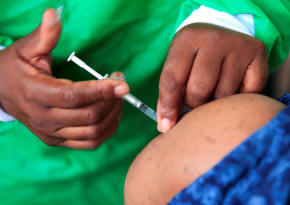Zimbabwe nurses to start strike on Monday over pay
 Send a link to a friend
Send a link to a friend
 [June 17, 2022]
HARARE (Reuters) - Zimbabwean nurses
unions said on Thursday their members would strike next week to protest
at poor salaries and working conditions, the second walk-out by nurses
since the COVID-19 pandemic began. [June 17, 2022]
HARARE (Reuters) - Zimbabwean nurses
unions said on Thursday their members would strike next week to protest
at poor salaries and working conditions, the second walk-out by nurses
since the COVID-19 pandemic began.
"Our members will not be able to turn up for duty starting on Monday
June 20," Zimbabwe Professional Nurses Union president Robert Chiduku
said in a letter addressed to the Parirenyatwa Group of Hospitals.
The government and health workers are at an impasse over pay, as
inflation in Zimbabwe jumped to 131.7% in May, a grim echo of the
hyperinflation that wiped out everyone's savings a decade ago.
The last strike, in 2020, forced hospitals to turn away patients during
the coronavirus pandemic.

The government did not immediately respond to a request for comment.
Nurses in Zimbabwe are paid 30,000 Zimbabwe dollars ($79.37) a month,
the unions say.
Chiduku said the union had "combined forces with our sister unions. The
mood is people are fed up. Our salaries are pathetic", Chiduku told
Reuters.
[to top of second column]
|

A nurse vaccinates a health worker against the coronavirus disease
(COVID-19), in Harare, Zimbabwe, February 18, 2021. REUTERS/Philimon
Bulawayo
 Enock Dongo, head of the Zimbabwe
Nurses Association (Zina), said he was mobilising members for the
strike, but was waiting to hear a response from them before
declaring that they would join in.
A strike would further cripple a health sector already understaffed
by nurses leaving to work in the West.
Zimbabweans have been losing patience with President Emmerson
Mnanagwa's government, which has promised to end years of economic
crisis that started under his predecessor Robert Mugabe. The
government blames Western sanctions on some of its officials for the
economic crisis.
($1 = 378.0000 Zimbabwe dollars)
(Reporting by Nyasha Chingono; Editing by Tim Cocks and Alison
Williams)
[© 2022 Thomson Reuters. All rights
reserved.] This material may not be published,
broadcast, rewritten or redistributed.
Thompson Reuters is solely responsible for this content.
 |